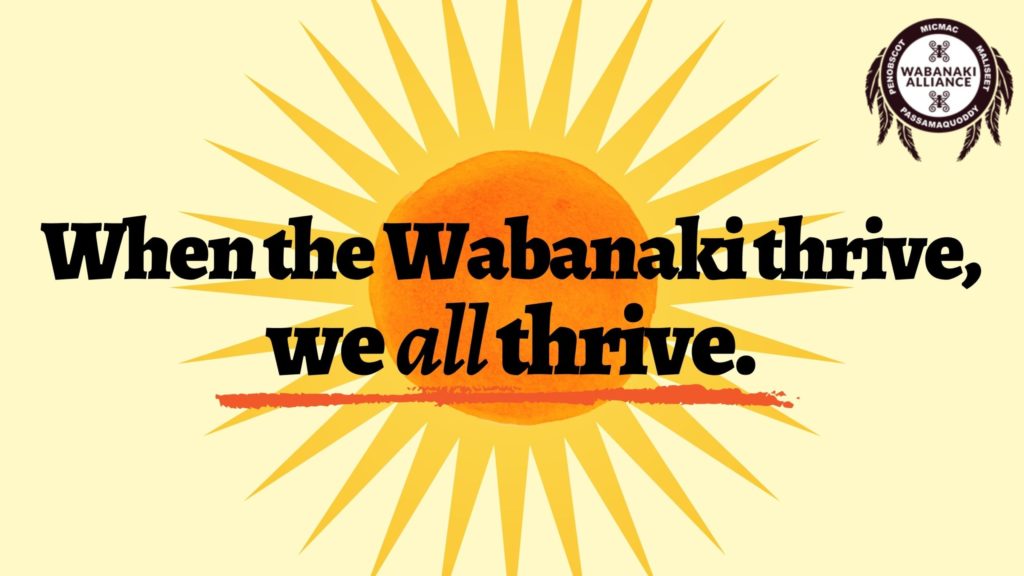At its core, tribal sovereignty is about fairness.
LD 1626, “An Act Implementing the Recommendations of the Task Force on Changes to the Maine Indian Claims Settlement Implementing Act” aims to finally recognize the sovereignty of three of Maine’s tribes — the Penobscot Nation, the Passamaquoddy Nation, and the Houlton Band of Maliseets — and put the three tribes on an equal footing with 570 federally recognized tribes whose right are guaranteed under federal law.
LD 1626 would:
- Restore tribes’ authority to undertake their own economic development programs, to decide for themselves how to make best use of the natural resources on their land, and ultimately invest in their people. Two centuries of oversight and mismanagement by the State of Maine has impoverished Maine’s tribes. For example, more than one in three residents of tribal lands lives below the federal poverty line in Maine — that’s more than three times the statewide poverty rate.1 Self-determination will allow tribal members to achieve greater economic stability and prosperity.
- Restore tax sovereignty to Maine’s tribes, giving the tribes the exclusive authority to tax tribal members on tribal land, and requiring the state to repatriate sales taxes collected on tribal lands. In other words, the bill would ensure that tribal members’ money stays with the tribal community, rather than potentially funding state programs from which tribal members may not benefit.
- Allow the tribes to decide which investments are most important for their people, communities, and future generations, and the best level of taxation to achieve those goals. Tax sovereignty will strengthen the ability of the tribes to keep tribal money circulating in their community and tribal economy, as well as capturing revenue from visitors to their land — just as Maine taxes wealth and income within its borders to fund programs for Mainers, supplemented by revenue from tourism taxes.
- Paves the way for easier reclamation of ancestral land by Maine tribes asd make it easier for the tribal nations to retrieve land stolen by the State of Maine centuries ago by removing time limits and the ability of state and local government to veto these land transfers, both of which currently constrain the land available for the tribes to reclaim. The history of land being stolen from tribal nations is well-known. And while the Maine Indian Land Claims Settlement Act of 1980 provided tribes with funding to purchase their ancestral land, the state has placed conditions on those purchases which have made land reclamation all but impossible.
- Recognize the tribes’ exclusive right to regulate hunting and fishing on their own land. The ability to own land is a key component to building community assets, and this provision of LD 1626 will go a long way toward creating greater prosperity for Maine tribes. Easier land reclamation would support the tribes’ traditional industries, such as hunting and fishing.
- Recognize the jurisdiction of tribal courts, which will help address the inequities faced by Indians in Maine’s criminal justice system. Mainers from American Indian backgrounds are currently four and a half times as likely to be incarcerated as Mainers from white, non-Hispanic backgrounds.2 The racial discrimination which leads to higher rates of arrest and conviction for non-white Americans reduces their employment prospects and ultimately harms their ability to thrive economically.
By recognizing the inherent sovereignty of Maine’s tribes, Mainers would not only be correcting a historic injustice. We all benefit when our friends and neighbors are given the tools to be economically successful. This applies to the tribal nations as well. When they succeed, we all succeed.
Notes:
[1] MECEP analysis of US Census Bureau, American Community survey, 2015-2019 data. Compiled data for the Penobscot Nation, Passamaquody Nation and Houlton Band of Maliseets. Thirty nine percent of individuals in these areas lived below the poverty line.
[2] MECEP analysis of US Bureau of Justice Statistics, Prisoners in 2019, and US Census Bureau, American Community Survey, 2019 data.




